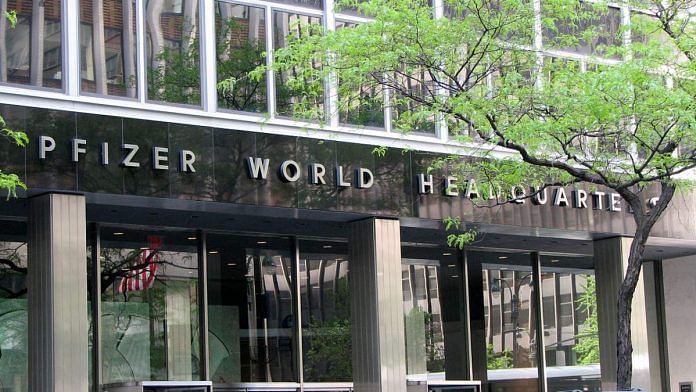
New Delhi: American pharma giant Pfizer Monday said the company was unable to attend expert panel meetings of the Modi government to seek emergency nod for its Covid-19 vaccine due to “extremely short” notice period of “a few hours or less”.
It also cited “time-zone limitations” as its team is based out of the United States.
Pfizer — which became the first pharmaceutical firm to apply for emergency use for its Covid-19 vaccine from the Drugs Controller General of India (DCGI) — was missing from every “crucial” Subject Expert Committee’s (SEC) meeting starting from 30 November to 2 January.
As a result, on 3 January, the other vaccines — Covishield by Oxford University and AstraZeneca, and Covaxin by Bharat Biotech and Indian Council of Medical Research (ICMR) — which applied later than Pfizer for the approval, received the nod.
Replying to an email sent by ThePrint to understand the reason behind the company’s absence from the meetings, a Pfizer spokesperson said, “Pfizer sought an opportunity to participate in the SEC consultations towards an Emergency Use Authorisation (EUA) for our Covid-19 vaccine.
“However, the company representatives have been unable to participate in previous meetings due to extremely short notices of a few hours or less, and time-zone limitations given that the participating team is primarily based out of the United States.”
Experimental vaccine shots developed by Pfizer, along with German biotechnology firm BioNTech SE, have shown more than 90 per cent efficacy in stopping SARS-CoV-2 infections.
We are compiling responses, says Pfizer
The company emphasised that it is keen on bringing Pfizer-BioNTech vaccine to India and is working on “compiling responses” for upcoming presentations.
“Pfizer remains committed to working with the Government of India and providing equitable access to our Covid-19 vaccine,” the spokesperson said, adding that “in the meantime, we are in the process of compiling responses to queries raised by the regulator on the data provided”.
“We remain committed to engaging with the Government of India to make this vaccine available for use by the government in the country,” the company said.
After applying for EUA at DCGI’s office in December, the company had told ThePrint “it will supply this vaccine only through government contracts based on agreements with respective government authorities and following regulatory authorisation or approval”.
The main concern for developing countries, including India, for buying Pfizer’s vaccine was the requirement of ultra cold storage as the mRNA technology needs the vaccine to be stored at minus 75 degrees Celsius (plus-minus 15 degrees).
However, the company had told ThePrint that “detailed logistical plans and tools to support effective vaccine transport, storage and temperature monitoring” has been developed.
Subscribe to our channels on YouTube & Telegram
Why news media is in crisis & How you can fix it
India needs free, fair, non-hyphenated and questioning journalism even more as it faces multiple crises.
But the news media is in a crisis of its own. There have been brutal layoffs and pay-cuts. The best of journalism is shrinking, yielding to crude prime-time spectacle.
ThePrint has the finest young reporters, columnists and editors working for it. Sustaining journalism of this quality needs smart and thinking people like you to pay for it. Whether you live in India or overseas, you can do it here.